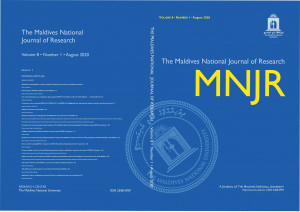Self-sufficiency in food: prospects on the island of Fuwahmulah, Maldives
DOI:
https://doi.org/10.62338/4me2tp57Keywords:
Food security, self-sufficiency, staple diet, staple food, agricultureAbstract
This article presents the findings of a study aimed at assessing prospects for self-sufficiency in food on the island of Fuwahmulah, Maldives. A mixed research methodology combining a survey on a representative sample and key informant interviews was used to elicit responses from households and crop growers respectively on their existing staple food items, perceptional suitability of locally grown crops as staple food and key issues affecting the cultivation of crops on the island. The research finds that the top three items consumed as staple foods in households are imported produce and items. Responses also indicate that locally-grown crops are perceived as suitable staple food for the island folks. The research concludes that prospects exist for a significant level of self-sufficiency which may be achievable with needed support.
References
Adheel, A. (2017). Best Practices of Integrated Plant Nutrition System in Maldives. In F. N. Jahan, & T. R. Gurung, Best Practices of Integrated Plant Nutrition Systsm in SAARC Countries. Dhaka, Bangladesh: SAARC Agriculture Centre.
Adheel, A. (2019). Integrated Plant Nutrition System Modules for Major Crops and Cropping Systems in Maldives. In S. A. Centre, Integrated Plant Nutrition Systems Modules for Major Crops and Cropping Systems in South Asia (pp. 140‑153). Dhaka, Bangladesh.
Baer‑Nawrocka, A., & Sadowski, A. (2019). Food security and food self‑sufficiency around the world: A typology of countries. PLOS ONE, 14(3).
Bishwajit , G., Sarker, S., Kpoghomou, M. ‑A., & Gao. (2013). Self‑sufficiency in rice and food security: a South Asian perspective. Agriculture & Food Security, 2(1). doi:10.1186/2048‑7010‑2‑10
Chernova, V. Y., Zobov, A. M., Degtereva, E. A., Starostin, V. S., & Andronova, I. V. (2020). Sustainable Economy: evaluation of food self‑sufficieny in Russia. Entrepreneurship and Sustainability Issues, 7(3), 1541‑1554.
Clapp, J. (2016). Food Self Sufficiency and International Trade: A False Dichotomy? (Technical Note). The State of Agricultural Commodity Markets – In‑Depth. Rome: Food and Agricultural Organization.
Clapp, J. (2017). Food self‑sufficiency: making sense of it, and when it makes sense. Food Policy, 66, 88‑96.
Dukhnytskyi, B. (2018). Self‑sufficiency of the Ukrainian domestic food market. Ekonomika APK, 25‑30. Fader, M., Gerten, D., Krause, M., Lucht, W., & Cramer, W. (2013). Spatial decoupling of agricultural production and consumption: quantifying dependences of countries on food imports due to domestic land and water constraints. Environmental Research Letters, 8(1). doi:10.1088/1748‑9326/8/1/014046
Food and Agricultural Organization. (1996). World Food Summit: 12. Food and International Trade: technical background document executive summary. Retrieved from FAO Website: http://www.fao.org/3/w2612e/w2612e12.htm
Food and Agriculture Organisation. (1999). Implications of Economic Policy for Food Security: a training manual. Retrieved from http://www.fao.org/3/x3936e/X3936E03.htm#national
Fuwahmulah City Council. (2020, June 2). Data requested for study on self‑sufficiency in food. Fuwahmulah, Maldives.
Hassan, R. (2020, June). Food supply chain in the time of COVID‑19. Maldives Economic Review, 1(4), 29‑34. Retrieved from maldiveseconomicreview.com
Ministry of Environment and Energy. (2014). Environment and social assessment and management framework: climate change adaptation project.
Mohamed, G. (2018). Agroecological Analysis of Maldivian Agricultural System to Improve Nutrient Management (Master›s thesis). Alnarp: Swedish University of Agricultural Sciences.
Mohamed, G. (2018). Innovative Agricultural Technologies in Maldives. In N. Sultana, F. N. Jahan, & S. M. Bokhtiar, Innovative Agricultural Technologies in South Asia. Dhaka, Bangladesh: SAARC Agriculture Centre.
Mohamed, G. (2019). Agricultural Research and Development: policy and program priorities in Maldives. In R. B. Shrestha, S. M. Bokhtiar, R. Ketarpal, & Y. B. Thapa, Agricultural Policy and Program Framework: priority areas for research and development.
Mohamed, I. (2020, June). COVID‑19 Pandemic: the begining of an end to our confidence in the voluntary self‑refuge of food security. Maldives Economic Review, 1(4), pp. 3‑8.
Najeeb, F. (2020, June). Priorities: food security or self‑sufficiency in food? Maldives Economic Review.
Porkka, M., Kummu, M., Siebert, S., & Varis, O. (2013). From food insufficiency towards trade dependency: a historical analysis of global food availability. PLoS One, 8(12).
Shafia, A. (2004). Country Report on the State of Animal Genetic Resources.
Shakoor, I. A. (2020, June). Food Security and the principle of comparative advantage. Maldives Economic Review, 1(4), pp. 41‑44.
UN Evironment Programme. (2005). Maldives Post‑Tsunami Environmental Assessment. UN Environment Programme. Retrieved from https://www.unenvironment.org/resources/report/maldives‑post‑tsunami‑environmental‑assessment
Wegren , S. K., & Elvestad, C. (2018). Russia’s food self‑sufficiency and food security: an assessment. Post‑Communist Economies, 5)30), pp. 587‑565. doi:14631377.201/10.10808.1470854



